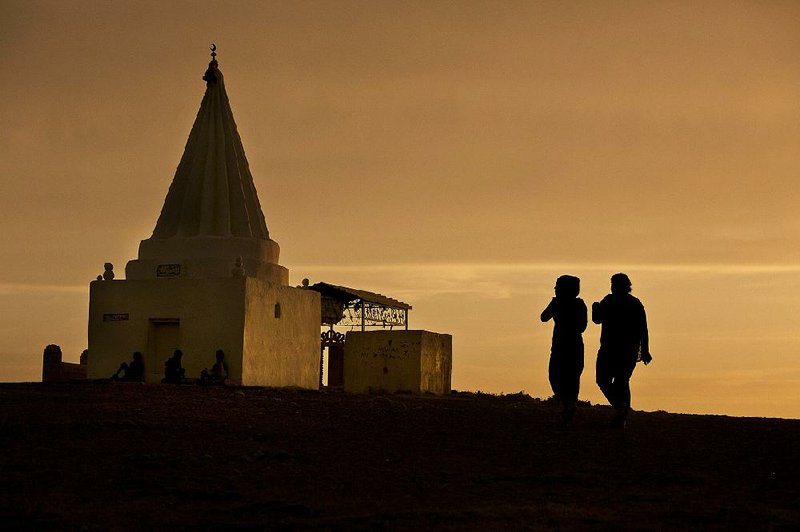WASHINGTON -- War-crimes investigators collecting evidence of the Islamic State militant group's operation to kidnap thousands of women as sex slaves say they have a case to try Islamic State leaders with crimes against humanity but cannot get the global backing to bring current detainees before an international tribunal.
Two years after the Islamic State's onslaught in northern Iraq, the investigators, as well as U.S. diplomats, say President Barack Obama's administration has done little to pursue prosecution of the crimes that Secretary of State John Kerry has called genocide. Current and former State Department officials say that an attempt in late 2014 to have a legal finding of genocide was blocked by the Defense Department, setting back efforts to prosecute Islamic State members suspected of committing war crimes.
"The West looks to the United States for leadership in the Middle East, and the focus of this administration has been elsewhere -- in every respect," said Bill Wiley, the head of the independent investigative group, the Commission for International Justice and Accountability.
Washington officials say the Defense Department and the administration as a whole were concerned that court trials would distract from the military campaign. But the diplomats say that justice is essential in a region where members of religious minorities have been terrorized. The officials spoke on condition of anonymity because they were not authorized to discuss the issue.
The U.S. has no legal obligation to take on the genocide of the Yazidi minority group, but Obama has said that "preventing mass atrocities and genocide is a core national security interest and a core moral responsibility of the United States of America."
Stephen Rapp, who stepped down as the administration's ambassador at large for war crimes last year, said the administration should have moved early to help secure evidence of Islamic State atrocities and push for the creation of special Iraqi courts to try war crimes.
"The priority for the U.S. government is to win the war against the Islamic State and destroy them," Rapp said. "It's been profoundly disappointing because the idea of accountability has been such a low priority."
Rapp is now the chairman of the advisory board of the commission, which has investigators in Iraq who work with the Kurdish regional government to formally document the Islamic State crimes, including those against the Yazidis. They have built a case implicating the entire Islamic State command structure in a plot to kidnap Yazidi women and girls and establish a sex-slave market.
The plan was executed by an organized bureaucracy, from temporary sorting facilities -- including a prison, schools and a curtained ballroom where the Yazidis were divided by age and willingness to convert to Islam -- to waiting buses that would haul them by the dozens across the border to Raqqa, Syria. The Islamic State's Shariah courts soon stepped in, to settle contract disputes and ensure that its financial hierarchy got its cut of the sex-slave proceeds.
"You have members of [the Islamic State] who were engaged in ensuring that this system continued and that it functioned well," said Chris Engels, the American lawyer who is leading the commission's legal investigation. Without a legal documentation of their identities from the top down, many could "slide into refugee streams" and disappear, he said.
Though there are at least dozens of Islamic State extremists in custody in Iraq, there have been no prosecutions for the crimes against humanity that the U.S. -- among many others -- insist have taken place. On Tuesday, the Obama administration's envoy for the coalition to counter Islamic State militants, Brett McGurk, tweeted that he "pledged full accountability" for Islamic State crimes against the Yazidis, whom the Islamic State considers infidels because of their religion.
In 2012, Obama announced what he called a comprehensive strategy to prevent and respond to war crimes with the establishment of an atrocities prevention board.
But in a recent investigation, The Associated Press found that even in territories liberated from Islamic State militants by Kurdish forces, dozens of mass graves have been left unsecured.
"It's a tragedy that we are not getting in there and securing these sites where we can and doing things like collecting DNA evidence," Rapp said.
A measure by the House that calls on the U.S. to fund precisely the kind of court envisioned by the investigators demands a hefty allocation of resources. The war-crimes commission says it would need about $6.6 million and about six months to get the trials going.
"If the administration was committed to criminal investigations of perpetrators, then it would be robustly funding criminal investigations of perpetrators," said Rep. Chris Smith, a New Jersey Republican who sponsored the bill.
The State Department said the U.S. was promoting accountability, and spokesman Mark Toner said the administration is "supporting ongoing efforts to collect, document, preserve and analyze evidence of atrocities for transitional justice processes." He provided no specifics.
Information for this article was contributed by Balint Szlanko and Josh Lederman of The Associated Press.
A Section on 09/25/2016

